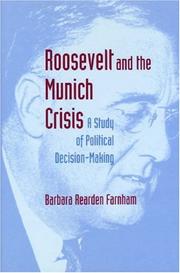| Listing 1 - 2 of 2 |
Sort by
|
Book
ISBN: 069119436X 0691203717 Year: 2021 Publisher: Princeton : Princeton University Press,
Abstract | Keywords | Export | Availability | Bookmark
 Loading...
Loading...Choose an application
- Reference Manager
- EndNote
- RefWorks (Direct export to RefWorks)
The president of the United States is commonly thought to wield extraordinary personal power through the issuance of executive orders. In fact, the vast majority of such orders are proposed by federal agencies and shaped by negotiations that span the executive branch. 'By Executive Order' provides the first comprehensive look at how presidential directives are written - and by whom. In this eye-opening book, Andrew Rudalevige examines more than five hundred executive orders from the 1930s to today - as well as more than two hundred others negotiated but never issued - shedding vital new light on the multilateral process of drafting supposedly unilateral directives.
Executive power --- Executive orders --- Separation of powers --- Presidents --- History --- 1900-2099 --- United States. --- Adam L. Warber. --- American presidency. --- Article II. --- Bill Clinton. --- Bush. --- EO. --- EOs. --- Eisenhower. --- Enigma of Presidential Power. --- Executive Orders and the Modern Presidency. --- Fang-Yi Chiou. --- Gerald Ford. --- Graham G. Dodds. --- JFK. --- Jimmy Carter. --- John F. Kennedy. --- LBJ. --- Lawrence S. Rothenberg. --- Lyndon Johnson. --- Nixon. --- Obama. --- Office of Management and Budget. --- Reagan. --- Roosevelt. --- Take Up Your Pen. --- Truman. --- Trump. --- White House. --- bureaucratic politics. --- central clearance. --- executive action. --- presidential history. --- presidential unilateralism. --- unilateralism.

ISBN: 0691070741 0691227519 Year: 2000 Publisher: Woodstock : Princeton University Press,
Abstract | Keywords | Export | Availability | Bookmark
 Loading...
Loading...Choose an application
- Reference Manager
- EndNote
- RefWorks (Direct export to RefWorks)
Franklin Roosevelt's intentions during the three years between Munich and Pearl Harbor have been a source of controversy among historians for decades. Barbara Farnham offers both a theory of how the domestic political context affects foreign policy decisions in general and a fresh interpretation of FDR's post-Munich policies based on the insights that the theory provides. Between 1936 and 1938, Roosevelt searched for ways to influence the deteriorating international situation. When Hitler's behavior during the Munich crisis showed him to be incorrigibly aggressive, FDR settled on aiding the democracies, a course to which he adhered until America's entry into the war. This policy attracted him because it allowed him to deal with a serious problem: the conflict between the need to stop Hitler and the domestic imperative to avoid any risk of American involvement in a war. Because existing theoretical approaches to value conflict ignore the influence of political factors on decision-making, they offer little help in explaining Roosevelt's behavior. As an alternative, this book develops a political approach to decision-making which focuses on the impact that awareness of the imperatives of the political context can have on decision-making processes and, through them, policy outcomes. It suggests that in the face of a clash of central values decision-makers who are aware of the demands of the political context are likely to be reluctant to make trade-offs, seeking instead a solution that gives some measure of satisfaction to all the values implicated in the decision.
Roosevelt, Franklin D. --- Munich Four-Power Agreement (1938) --- United States --- Germany --- Foreign relations --- Case studies. --- Decision making --- Acceptability. --- Aid to democracies. --- Airpower. --- Appeasement. --- Authoritarian government. --- Behavioral Decision Theory. --- Belief systems. --- Berchtesgaden. --- Blockade. --- Bolstering. --- Buck-passing. --- Bureaucratic politics. --- Charlottesville Program. --- Cognitive effort. --- Compromise. --- Consensus. --- Consistency. --- Czechoslovakia. --- Decision rules. --- Democratic peace. --- Diesing, Paul. --- Dror, Yehezkel. --- Emerson, William. --- Europe. --- France. --- George, Alexander. --- Godesberg meeting. --- Good Neighbor Policy. --- Haglund, David. --- Helium controversy. --- Hull, Cordell. --- Hyde Park meetings. --- Incrementalism. --- Interventionists. --- Isolationism. --- Jouaux, Leon. --- Keynes, John Maynard. --- Levels of analysis. --- Lindsay, Sir Ronald. --- Lothian, Lord. --- Nine Power Conference. --- Opportunity costs. --- Optimizing. --- Plausibility probe. --- Policy analysts. --- Rainbow Plans. --- Rearmament. --- Roosevelt administration. --- Search-design continuum. --- neutrality.
| Listing 1 - 2 of 2 |
Sort by
|

 Search
Search Feedback
Feedback About
About Help
Help News
News